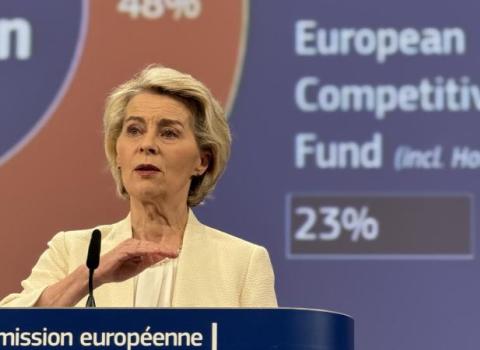The two instruments must be complementary, serving distinct phases of the innovation lifecycle, lobby groups say

Photo credits: symbiot / BigStock
Research organisations in Brussels are urging the European Commission to develop the next Framework Programme, FP10, and the European Competitiveness Fund (ECF) as “two clearly distinct EU instruments both legally and financially” within the upcoming Multiannual Financial Framework.
In June, Commission President Ursula von der Leyen reaffirmed her intention to closely link FP10 with the planned ECF, describing it as a fund that would support the full innovation lifecycle. While she confirmed that FP10 would remain a standalone programme, the practical implications of this “tight connection” have yet to be clarified.
In response, a coalition of research organisations including the League of European Research Universities (LERU) and the Guild of European Research-Intensive Universities has released a set of recommendations aimed at guiding the Commission in aligning the ECF with FP10, which must stay standalone and ringfenced, they write.
The Commission is expected to unveil its proposal for the next long-term EU budget, including the ECF and FP10, on July 16.
According to the group, FP10 should focus exclusively on funding research and innovation, with an emphasis on generating new knowledge and breakthroughs. In contrast, the ECF should be tasked with scaling up these innovations and supporting companies in bringing them to market. The two instruments, they argue, would therefore serve distinct purposes, operate under different rules, mobilise separate funding tools, and benefit different actors.
This structure, they stress, must be backed by a dedicated FP10 budget of at least €200 billion.
“We need more funding, and less political steering,” said Kurt Deketelaere, secretary general of LERU. “If an ECF, closely linked to FP10, helps support and complement this approach, we will welcome it with open arms.”
Asked by Science|Business what might happen if the Commission proposes splitting research and innovation instruments between FP10 and the ECF, Deketelaere said: “The Commission only makes a proposal and at the end of the day the European Parliament and the Competitiveness Council decide. So we of course also share our views with [them].”
The Council is ready to engage. Denmark’s minister for higher education and science, Christina Egelund, told Science|Business that discussions around the structure of FP1-Horizon Europe’s successor and its connection to the ECF will be high on the agenda during the Danish EU Council presidency, which began on July 1.
Related articles:
- ‘Self-standing’ FP10 will be ‘tightly connected’ to European Competitiveness Fund, Von der Leyen says
- EU research lobbies team up to ask for R&D budget boost
Words put in practice
As part of their joint paper, the research organisations put forward concrete proposals for structuring the relationship between FP10 and the ECF.
“When EU instruments fund more than research and innovation activities,” they write, “they will need to be co-financed by other parts of the MFF.” In their view, non-research components of the Horizon Europe Missions, of the European Partnerships, of the European Institute of Innovation and Technology, and of the EIC Accelerator should be funded outside FP10.
To preserve a strong foundation of curiosity-driven science, the paper calls for bottom-up funding programmes to be reinforced. This includes the European Research Council (ERC), the Marie Skłodowska-Curie Actions (MSCA) and relevant parts of the EIC. In particular, the ERC and MSCA budgets should be significantly increased.
The group also supports maintaining effective Widening instruments and advocates the creation of a European agency modelled on the US Advanced Research Projects Agency to drive the development and scaling of technologies in strategic sectors. At the same time, the paper stresses the importance of preserving the civilian character of the Framework Programme, explicitly excluding military research from its remit.
Finally, the organisations endorse deeper expert involvement in line with the Heitor report’s recommendations. For instance, they propose the introduction of “challenge managers” to help coordinate the challenge-driven components of FP10 and the ECF.
“These experts will identify the most promising innovations for Europe's competitiveness and ensure that they receive support from ideation up to their scaling-up from FP10 and the ECF, as relevant,” they said.





 A unique international forum for public research organisations and companies to connect their external engagement with strategic interests around their R&D system.
A unique international forum for public research organisations and companies to connect their external engagement with strategic interests around their R&D system.